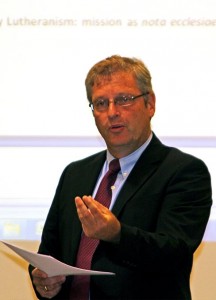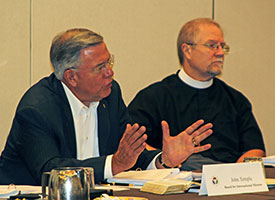By Megan Mertz
ST. LOUIS — The LCMS Boards for National Mission (BNM) and International Mission (BIM) began their first meetings following the LCMS convention in July by gathering for a joint session on the morning of Sept. 12.

The joint business of the two boards included a review with LCMS President Rev. Dr. Matthew C. Harrison of a draft of “A Theological Statement for Mission in the 21st Century,” a document mandated by Res. 1-03A of the 2013 Synod convention. This resolution calls for the Offices of National Mission and International Mission, together with their respective boards, to complete this statement by the end of 2014.
The document is a description of the theology for Witness, Mercy, Life Together. It addresses witness as a fundamental task, mercy as a sacred vocation and the God-given gift of life together in the church today. When finished, the statement will be used as the theological preface of both the BNM and BIM policy manuals.
“It is my desire that this preface will be a document that we can ultimately use in presenting a fulsome theological basis for the church’s work,” Harrison wrote in a letter accompanying the document.
During his report to the two boards, Chief Mission Officer Rev. Gregory K. Williamson also stressed the importance of strategic alignment in the work of the Synod.
“One of the consistencies we need is about our understanding of Lutheran missiology,” he said.
To that end, the Rev. Dr. Klaus Detlev Schulz, professor and chairman of Pastoral Ministry and Missions at Concordia Theological Seminary, Fort Wayne, Ind., led a study on Lutheran missiology. He examined the history of Lutheran missions, identifying how early Lutherans struggled to find a proper basis and motivation for mission work.
“Mission is an activity of people, the church in action,” said Schulz. “Missiology is a reflexive exercise that looks at the activity of the church critically but constructively.”
Schulz reminded the two boards that confessional fidelity should be a priority in mission work, but that missions cannot be “boxed in.” It is always moving, never static, he said. He also encouraged those in attendance to consider missiology as a way to build “responsible” churches around the world that have the ability to respond to external and internal pressures, fill their own churches with pastors and govern themselves well.
Following the joint session, the BIM reconvened Sept. 12-13 to discuss items related to international mission policy. Along with key members of the LCMS staff, the board debated metrics for measuring mission effectiveness. It also committed itself to writing policies to better clarify the relationship between the board and Synod staff.
In addition, the board re-elected the Rev. Bernhard Seter of Grafton, N.D., as chair. It also elected Kermit Almstedt of Weeki Wachee, Fla., as vice-chair and John Edson of Plymouth, Minn., as secretary.
During the meeting, the BIM voted to extend calls and solemn appointments to five career missionaries, four GEO (Globally Engaged in Outreach) missionaries and one international educator. These men and women will serve in the Africa, Asia Pacific, Eurasia, and Latin America and the Caribbean regions.
“The number of missionaries we sent was really encouraging,” said Seter. “The work that’s being done with these partner churches and those that want to come into partnership with us is really amazing.”
The next meeting of the Board for International Mission is set for Feb. 27-28.
Megan Mertz is a staff writer with LCMS Communications.
